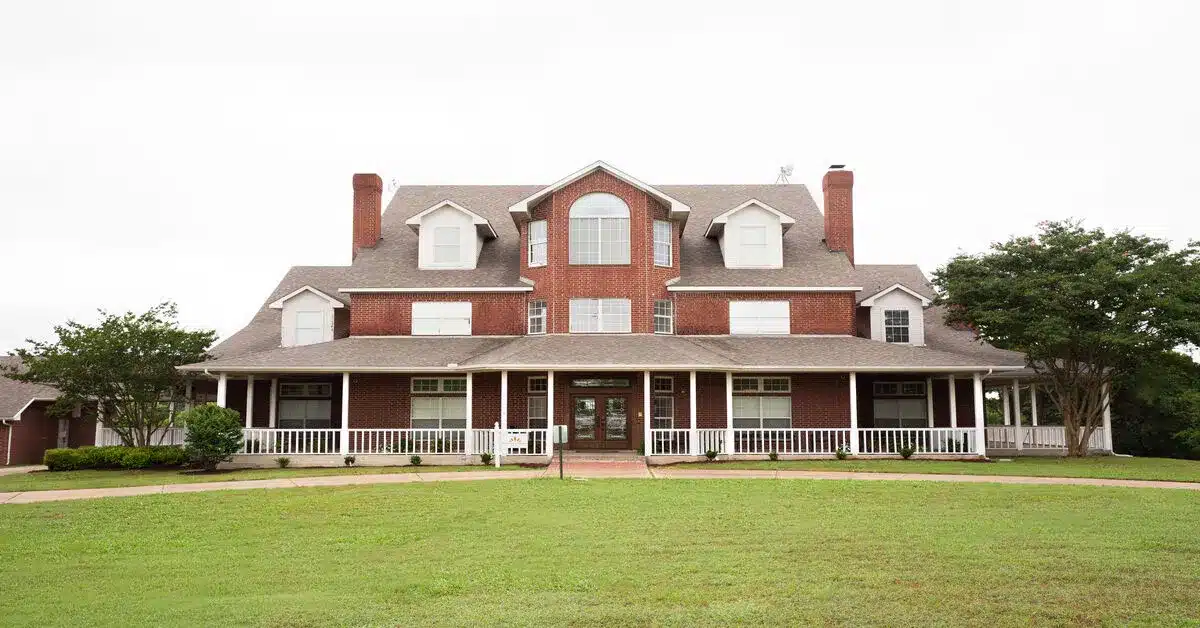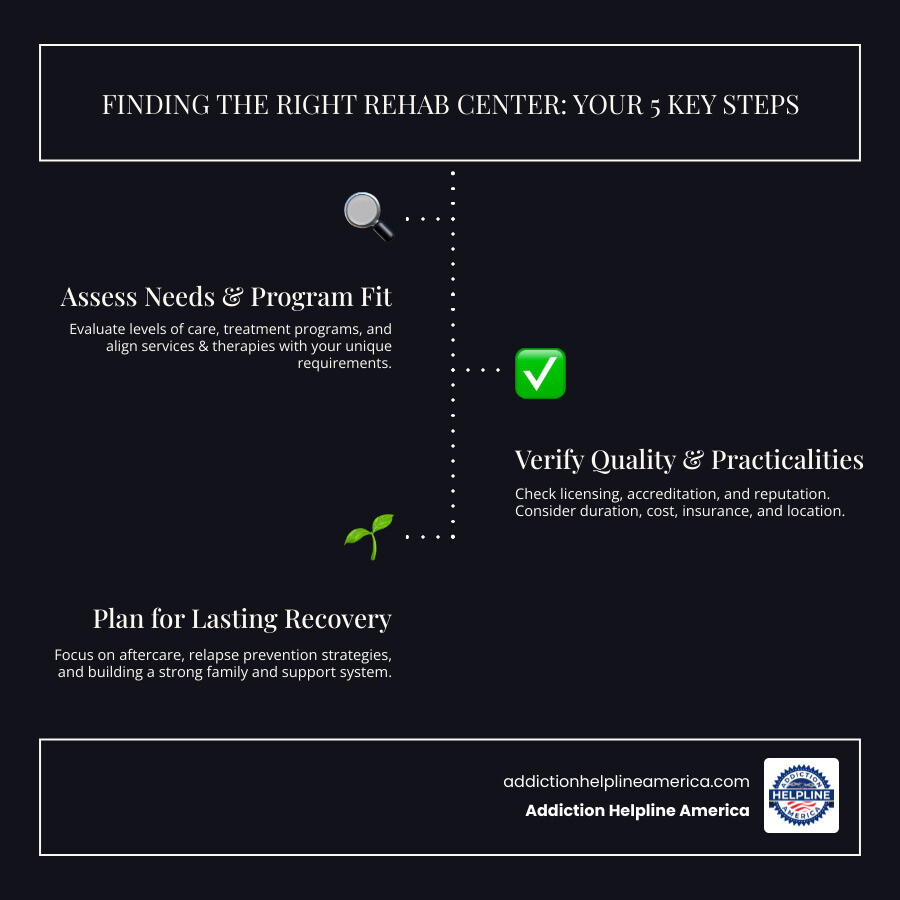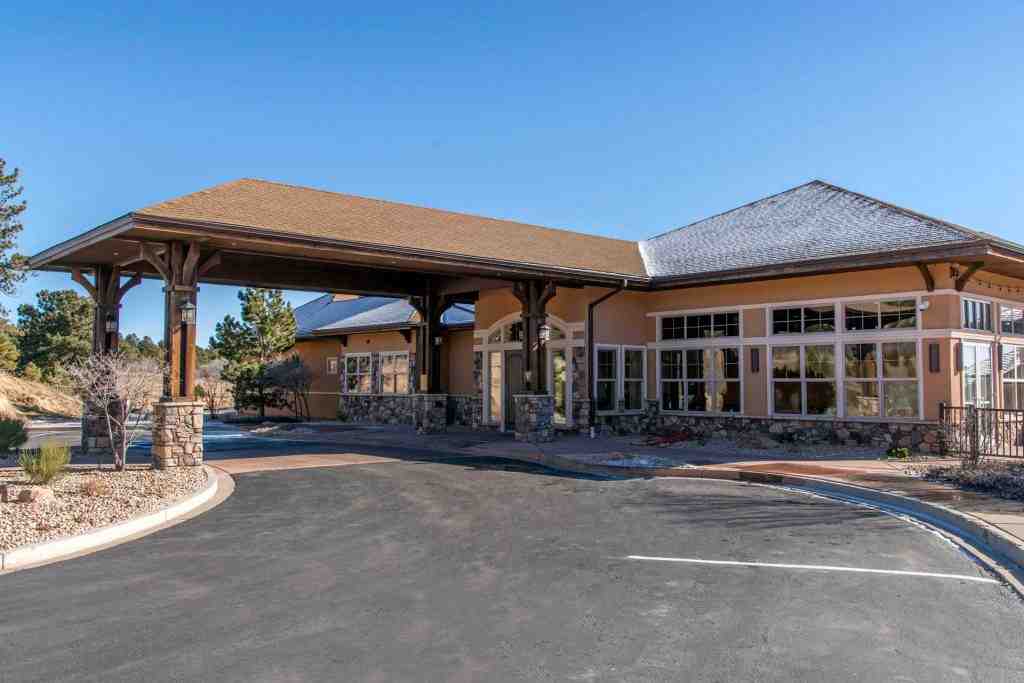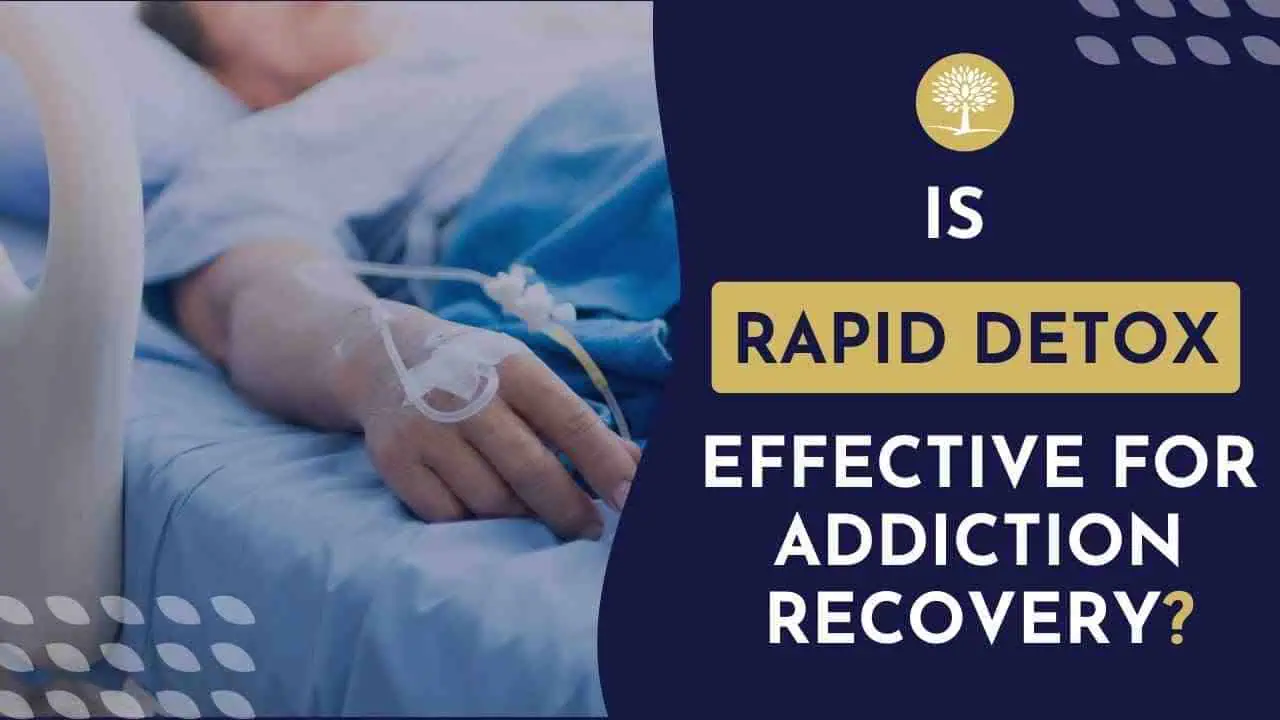
Understanding Your Options for Addiction Treatment
Rehab centers are specialized facilities providing professional treatment for substance use disorders, from medical detox to long-term recovery support. When searching for a rehab center, consider these key factors:
- Level of Care: Inpatient (residential, 24/7) vs. Outpatient (flexible, daily return home)
- Treatment Services: Medical detox, individual/group therapy, family programs
- Accreditation: State licensing and certifications ensure quality
- Program Duration: 30, 60, or 90 days, with flexible options
- Cost and Insurance: Verify coverage and explore payment options
- Aftercare Support: Alumni programs, sober living, and relapse prevention
The search for treatment can be overwhelming. Finding the right rehab center means matching your unique needs with a facility that offers the right combination of medical support, therapy, and long-term planning. Some centers specialize in specific substances like alcohol or opioids, while others focus on demographics like women, veterans, or those with co-occurring mental health conditions.
You don’t have to steer this alone. At Addiction Helpline America, we’ve helped thousands find rehab centers that align with their recovery needs. We provide confidential guidance, helping you make an informed choice that dramatically improves the chances of lasting recovery.

Important rehab centers terms:
Way #1: Evaluate the Levels of Care and Treatment Programs
The first step in choosing the right rehab center is understanding the different levels of care. Treatment is not one-size-fits-all; it’s a spectrum designed to meet you where you are. The right level depends on the severity of the addiction, co-occurring mental health issues, and your home environment. Your needs may also change during recovery, often starting with intensive care and transitioning to outpatient support.

Choosing the Right Type of Rehab Centers
The main choice is between inpatient and outpatient treatment. Both are effective but serve different needs.
Call Now – Your Journey to Recovery Begins Today!

Take the first step towards a healthier life! Call now to connect with our compassionate team and start your recovery journey today. Your path to healing awaits!
Our recovery specialists are available 24/7 to provide support, and all calls are confidential and free. Reach out anytime – we’re here to help!
Inpatient rehab, or residential treatment, means living full-time at a facility. This immersion in a substance-free environment removes you from daily triggers, allowing you to focus completely on healing. A typical program includes medically supervised detoxification, individual and group therapy, medication management, and aftercare planning. Most programs last 30 to 90 days, but Long Term Alcohol Rehab options provide extended support for those who need it. To determine if this intensive care is right for you, see our guide: Do I Need Inpatient Rehab?
Outpatient treatment provides professional care while you return home each day. This flexibility is ideal if you have work or family responsibilities and a supportive home environment. It is also more affordable. Intensive Outpatient Programs (IOPs) involve several hours of treatment on multiple days per week, while Partial Hospitalization Programs (PHPs) are more intensive, with treatment most of the day, five days a week, without the overnight stay. Outpatient care is best for mild to moderate addiction or as a step-down from inpatient treatment. Learn more in our guide on Inpatient and Outpatient Rehab.
| Feature | Inpatient Rehab | Outpatient Rehab |
|---|---|---|
| Location | Residential facility, live on-site | Live at home, commute to facility for treatment |
| Support Level | 24/7 medical and therapeutic support | Scheduled sessions, return home after |
| Environment | Structured, substance-free, immersive | Flexible, integrate treatment with daily life |
| Severity of Addiction | Moderate to severe, co-occurring disorders | Mild to moderate, strong home support |
| Duration | Typically 30-90+ days | Varies, often weeks to months, less intensive per day |
| Cost | Generally higher | Generally lower |
| Family Involvement | Often includes family therapy, but separation | Easier for ongoing family involvement |
The First Step: Detoxification
Before therapy can begin, many people need detoxification to clear their body of substances. This process can be dangerous, especially with alcohol, opioids, or benzodiazepines, as withdrawal symptoms can range from uncomfortable to life-threatening.
Professional medical supervision during detox is critical. In a supervised program, healthcare professionals monitor you 24/7, provide medications to ease symptoms, and manage any complications. This secure, substance-free environment also reduces the risk of relapse during this vulnerable period.
Crucially, detox alone is not treatment. It is the necessary first step to stabilize you physically. It must be followed by a comprehensive treatment program to address the psychological and behavioral aspects of addiction. Explore our Detox Programs page for more details or see what quality care looks like at facilities like the South Florida Detox Center in Port St. Lucie, FL.
Way #2: Align Services and Therapies with Your Needs
After determining the level of care, look at the services offered inside the rehab center. The best facilities don’t just focus on stopping substance use; they address the underlying reasons for it. Finding a center that offers the right mix of therapies for your individual needs is key to lasting recovery.

Core Therapeutic Services
Therapy is where you build a life you don’t want to escape from. Quality rehab centers offer several approaches:
- Individual therapy provides one-on-one time with a counselor to explore personal issues, trauma, and triggers in a safe, confidential space.
- Group therapy connects you with peers facing similar struggles, fostering a sense of community and shared learning.
- Family counseling helps repair damaged relationships and teaches family members how to support recovery effectively.
Evidence-based approaches like Cognitive Behavioral Therapy (CBT) help change negative thought patterns, while Dialectical Behavior Therapy (DBT) teaches skills for managing intense emotions. Many centers also use holistic approaches like yoga or art therapy to support overall well-being. Learn more about Types of Addiction Therapy and Holistic Drug Addiction Treatment.
Specialized Treatment Programs
Addiction rarely exists in a vacuum. Many people also struggle with mental health challenges, requiring integrated care.
- Co-occurring disorders (dual diagnosis) programs treat addiction and mental health conditions like depression or anxiety simultaneously. If you’re dealing with bipolar disorder, finding specialized providers is crucial. Our guide on Bipolar Disorder Doctors Near Me 2024 can help.
- Women-only programs create a safe space to address gender-specific issues like trauma and parenting concerns. Casa Capri Recovery is an example of a facility specializing in this care.
- Men-only programs address challenges unique to men, providing a space to express emotions and learn healthy coping skills. Explore our Men’s Inpatient Rehab options for this type of environment.
- Veterans programs offer trauma-informed care that understands military culture and the specific challenges veterans face, such as PTSD.
- LGBTQ+ affirming care provides a welcoming, culturally competent environment that addresses unique struggles related to identity and discrimination.
When evaluating a rehab center, ask about their expertise in these areas. Personalized care makes all the difference.
Way #3: Verify Licensing, Accreditation, and Reputation
When choosing a rehab center, you must verify that it is legitimate, safe, and provides quality care. This step is essential to protect your investment in recovery. A licensed and accredited facility follows established standards for patient safety and effective treatment.

What to Expect from Reputable Rehab Centers
A reputable facility will be transparent about its qualifications. Look for these non-negotiable credentials:
- State licensing is the mandatory baseline, ensuring the facility meets minimum health and safety standards. Always verify a center’s license with your state’s regulatory board.
- Accreditation from recognized national organizations is a voluntary step that shows a commitment to excellence beyond state requirements. It signifies rigorous evaluation of treatment practices, staff, and safety protocols.
- Reviews and testimonials offer insight into the daily experience at a facility. Look for patterns in feedback rather than focusing on single reviews.
- Success rates can be informative, but approach them with caution. Ask how “success” is measured, as definitions vary. A facility that is realistic about the challenges of recovery is often more trustworthy.
Finding a Facility
Use reliable resources to find licensed and accredited rehab centers:
- The 2024 National Directory of Drug and Alcohol Use Treatment Facilities lists verified facilities across the country, making it a great starting point for your search in states from Rhode Island to Missouri.
- Referral services like Addiction Helpline America simplify the process. Our team provides free, confidential guidance, connecting you to our vetted network of facilities that match your needs and insurance.
- Ask questions when you contact a center directly about their licensing, staff qualifications, and treatment approaches. Their willingness to answer honestly is a good sign.
- Facility tours, whether in-person or virtual, provide a feel for the environment. Pay attention to cleanliness, organization, and whether the atmosphere feels safe and welcoming.
Verifying credentials and asking questions helps you find a rehab center that will truly support lasting recovery.
Way #4: Consider Practical Factors: Duration, Cost, and Location
After narrowing down the type of care, it’s time to address practical factors like duration, cost, and location. These considerations can feel overwhelming, but they are solvable and shouldn’t prevent you from getting help. At Addiction Helpline America, we help families steer these real-world issues to find a rehab center that fits both clinical needs and life circumstances.
Call Now – Your Journey to Recovery Begins Today!

Take the first step towards a healthier life! Call now to connect with our compassionate team and start your recovery journey today. Your path to healing awaits!
Our recovery specialists are available 24/7 to provide support, and all calls are confidential and free. Reach out anytime – we’re here to help!
Treatment Duration
The ideal length of treatment depends on the addiction’s severity, the substances involved, and individual progress.
- 30-day programs provide a solid foundation, breaking the immediate cycle of addiction and introducing coping skills.
- 60-day programs allow more time for intensive therapy and building stronger relapse prevention strategies.
- 90-day programs are often considered the gold standard, as research shows that staying in treatment for at least 90 days leads to significantly better long-term outcomes. For severe cases, Long Term Alcohol Rehab options can extend from six months to a year.
Some rehab centers offer flexible stays that adapt to your progress. The right duration is the one that gives you the best chance at lasting recovery.
Understanding the Costs
The cost of rehab centers varies, but it should never be a barrier to getting help. There are many options available:
- Insurance coverage is often more comprehensive than people realize. Plans like United Healthcare Insurance Rehab Coverage and Anthem Blue Cross Insurance Rehab Coverage may cover a significant portion of treatment. We can help you verify your benefits and find in-network facilities.
- Private pay arrangements, including payment plans or sliding scale fees, are offered by many centers. Always ask about financial assistance.
- Free and low-cost options are available through state-funded programs and non-profit organizations. Our Free Alcohol Rehab Guide can help you find these services.
Treatment is an investment in your life. While the upfront cost may seem daunting, the cost of not getting help is almost always higher.
Geographic location is another key factor. Staying local can simplify family involvement and aftercare planning. Traveling for treatment can provide a necessary break from triggers and a fresh start. Your choice should be based on what best supports your recovery, not just convenience. We can help you weigh these factors and find the right fit.
Way #5: Plan for Long-Term Success with Aftercare and Family Support
Completing a rehab program is a major achievement, but it’s just the beginning. The transition back to everyday life is challenging, which is why planning for long-term success is crucial. Recovery is a continuous process, and having the right support systems in place makes all the difference.

Aftercare and Relapse Prevention
The best rehab centers prepare you for life after treatment with a concrete plan for maintaining sobriety.
- Sober living homes act as a bridge between treatment and independence, offering a structured, substance-free environment with peer support.
- Alumni programs keep you connected to a recovery community through meetings, events, and mentorship.
- Continuing therapy reinforces coping skills and provides ongoing support as new challenges arise.
- A solid relapse prevention plan helps you identify triggers and develop strategies to handle them. Our Relapse Prevention Program: Ultimate Guide can help you create a personalized plan.
- Support groups like Alcoholics Anonymous and Narcotics Anonymous offer free, accessible peer support. We can help you find Narcotics Anonymous meetings and other Support Groups and Social Support options.
For a full overview, see our guide Drug Rehab: What is Rehab Aftercare?.
The Role of Family and Support Systems
Addiction impacts the entire family, but recovery is an opportunity for everyone to heal.
- Family therapy helps mend broken trust, improve communication, and educate loved ones about the disease of addiction.
- Education programs for loved ones teach families how to create a supportive home environment without enabling destructive behaviors.
- Building healthy relationships with supportive friends and family is a vital part of long-term success.
- Peer support groups for families, like Al-Anon and Nar-Anon, provide a safe space for loved ones to find their own support and coping strategies.
A strong support system dramatically improves the likelihood of sustained recovery, creating a network of care that extends far beyond the walls of any rehab center.
Frequently Asked Questions about Rehab Centers
When considering treatment, it’s normal to have questions. Here are answers to some of the most common ones we hear.
What are the signs that someone may need professional addiction treatment?
Recognizing the need for help is the first step. Key signs include:
- Behavioral changes: Increased secrecy, lying, new and concerning friends, and risky behaviors like driving under the influence.
- Physical signs: Unexplained weight changes, poor hygiene, unusual sleep patterns, dilated or constricted pupils, or tremors. Specific drugs may have unique signs, as detailed in our guide on Is the PCP Drug Addictive? Symptoms.
- Neglecting responsibilities: Missing work or school, or being unable to manage basic household needs.
- Relationship and financial problems: Frequent arguments, withdrawal from loved ones, and unexplained financial difficulties.
- Failed attempts to quit: Expressing a desire to stop but being unable to, often due to increased tolerance and severe withdrawal symptoms.
If you see these signs, a rehab center can provide the professional help needed to break the cycle.
What is the process for admitting someone to a rehab facility?
Admissions are streamlined to make the transition as smooth as possible.
- Initial Assessment: A confidential phone call to gather information about substance use history and any co-occurring medical or mental health conditions.
- Insurance Verification: We can help you understand your coverage and find in-network facilities, removing a major source of stress.
- Pre-Intake Screening: A more detailed evaluation to identify immediate medical needs, such as medically supervised detox.
- Travel and Packing: The rehab center helps coordinate travel logistics and provides a list of what to bring.
If your loved one is resistant to help, a professional intervention may be necessary. Our Drug Intervention Services can guide you through this process compassionately.
Can I find a rehab center for a specific substance like alcohol or meth?
Yes, and specialization is key. Different substances require different treatment approaches.
- Alcohol addiction requires careful medical management during withdrawal. Specialized programs understand the unique physical and social aspects of alcohol use. Explore Alcohol Rehab Options on our site.
- Methamphetamine addiction treatment often focuses on behavioral therapies to address intense cravings and repair cognitive function. You can search for regional options like Meth Rehab Colorado Springs.
- Opioid addiction is often treated with medication-assisted treatment (MAT), using medications like buprenorphine alongside counseling to stabilize brain chemistry and reduce cravings. Our guide to finding a Suboxone Clinic Near Me can help.
Asking about a facility’s experience with a specific substance ensures you receive a custom treatment plan, which significantly improves outcomes.
Call Now – Your Journey to Recovery Begins Today!

Take the first step towards a healthier life! Call now to connect with our compassionate team and start your recovery journey today. Your path to healing awaits!
Our recovery specialists are available 24/7 to provide support, and all calls are confidential and free. Reach out anytime – we’re here to help!
Conclusion
Choosing the right rehab center is about finding a program that understands your unique situation and can help you build a substance-free future. This means evaluating levels of care, aligning therapies with your needs, verifying credentials, considering practical factors, and planning for long-term aftercare.
The best rehab center for you is one that treats the whole person, addressing underlying issues and co-occurring conditions. Whether you need inpatient, outpatient, or specialized care, the right program is out there.
We know this journey is intimidating. The options, terminology, and financial concerns can feel overwhelming. But you don’t have to figure this out alone.
At Addiction Helpline America, we provide free, confidential guidance to help you steer this process. We’ll help you understand your insurance, identify matching programs, and connect you with rehab centers from our nationwide network. We are here to give you back a sense of control and hope.
Taking the first step is the bravest part of recovery. If you’re ready for change, our team is ready to walk beside you. Reach out through our Hotlines for Addiction, and let’s start your recovery journey together.
Our helpline is 100%
free & confidential
If you or someone you care about is struggling with drug or alcohol addiction, we can help you explore your recovery options. Don’t face this challenge alone—seek support from us.
Programs
Resources
Will my insurance
cover addiction
treatment?
We're ready to help
Find the best
drug or alcohol treatment
center
Are you or a loved one struggling with addiction? Call today to speak to a treatment expert.















